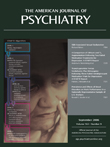Health Disparities in Care for Depression Possibly Obscured by the Clinical Significance Criterion
Abstract
BACKGROUND: In addition to symptoms, DSM-IV criteria for major depression require clinical significance, operationalized via reports of receipt of care or interference in functioning. The authors examined whether this confounding of symptoms with receipt of care and/or impairment affected racial differences in rates of major depression in the community. Method: Analysis of data from the 1999 National Health Interview Survey for a nationally representative community sample of 30,801 adults administered the depression module of the Composite International Diagnostic Interview–Short Form. Results: There were no differences between African American subjects and white/other subjects when diagnosis was based solely on symptoms. Symptomatic African American individuals were less likely to endorse either receipt of care or interference in functioning, so that the clinical significance criterion served to reduce their rates of DSM-IV diagnosis. Conclusions: The clinical significance criterion underestimates of the rate of depression for African American individuals relative to white/other subjects, which may in turn underestimate their need for services.



